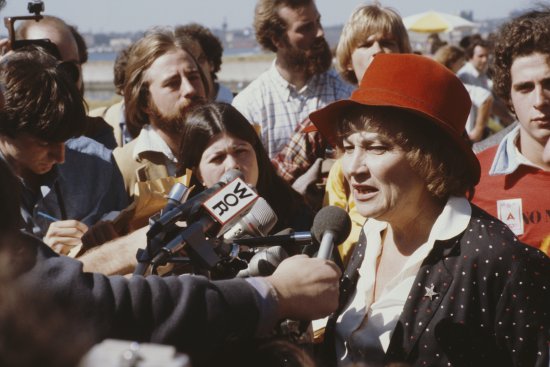
Bella Abzug introduced the bill that established the day, and that was just the beginning
On Aug. 26, 1970, 50,000 women marched down New York City’s Fifth Avenue in an undeniable display of the strength of second-wave feminism. They were celebrating the 50th anniversary of the 19th Amendment, which granted American women the right to vote, but they were also protesting the limits and expectations placed on American womanhood, demanding changes to childcare and abortion policies and education and employment opportunities. Many abandoned their usual domestic duties for the day, with spiritual sisters across the country staging sit-ins and takeovers of all-male bars.
One year to the day after the Women’s Strike for Equality March, Congress passed a resolution designating Aug. 26 as Women’s Equality Day, and 45 years later, the day continues to be a moment to reckon with how far women’s rights have come, and how far they have yet to go.
Though in truth there are many women to thank for establishing Women’s Equality Day—dating back to the suffragists who gathered at Seneca Falls in 1848—the woman most directly responsible was Congresswoman Bella Abzug, a Democrat from New York, who introduced the bill that would formally establish the day of recognition.
Get your history fix in one place: sign up for the weekly TIME History newsletter
Abzug’s push for Women’s Equality Day was, in fact, far more symbolic than many of the more concrete policies she made a reality in her six years in Congress, not to mention in the two decades prior to her election, which she spent as a lawyer fighting for human rights and civil rights. While in Congress, she co-founded the National Women’s Political Caucus along with Betty Friedan, Gloria Steinem and Shirley Chisholm, working to secure more elected positions for women in politics. She later introduced the first federal gay-rights bill, along with future New York City mayor Ed Koch. Failed bids for Senate and New York City mayor hardly slowed her roll, and she would continue fighting for equal rights until her death in 1998.
But Abzug is remembered as much for her accomplishments as for the way she went about realizing them: neither quietly nor politely, thank you very much. She was known for being brash and outspoken, described in the pages of TIME as “truculent and courageous,” with a New York City accent Norman Mailer said “could boil the fat off a taxi driver’s neck.” She spoke, almost always, from beneath a wide-brimmed hat which she began wearing in her early days as a lawyer when she was repeatedly mistaken for a secretary. As TIME wrote of her just 10 days before that 1971 resolution was passed: “No one, friend or enemy, denies that Bella Abzug has a certain presence.”
Bella Abzug, Co-Founder of the National Women’s Political Caucus














